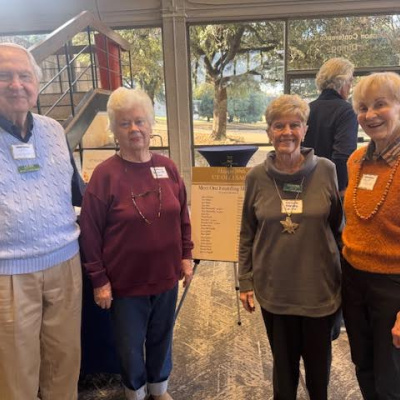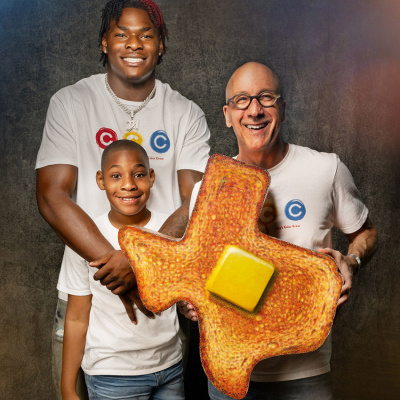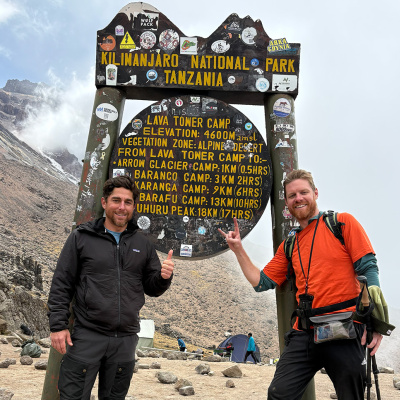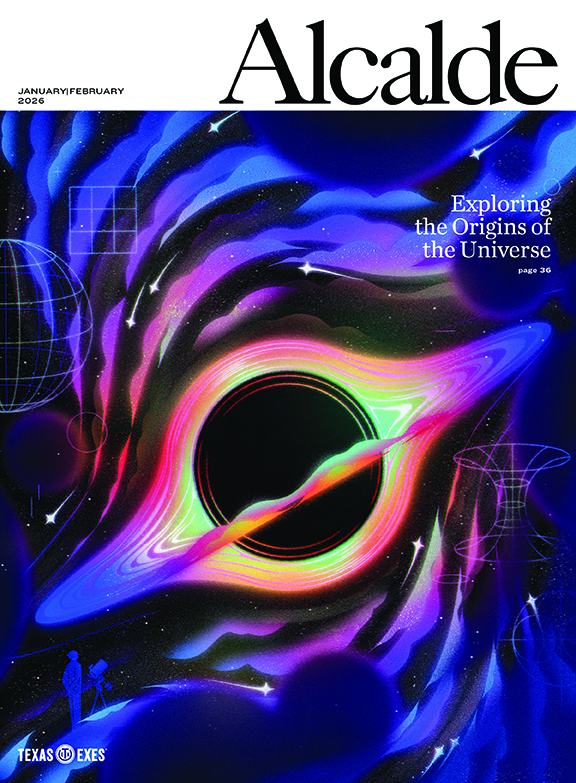A New Scholarship for Black Students Aims to Help Longhorns in the Business World

This fall, two Longhorns will enter the McCombs School of Business with a unique support system. Todd Maclin, BBA ’78, Life Member, a retired executive with a storied career at JPMorgan Chase, along with his wife and children, has created a Texas Exes scholarship designed to give Black students from the Dallas/Fort Worth area access to the personal and professional network the family has built together.
Motivated by the distressing news cycle and national conversation about race, the Maclins started talking last summer about what they could do to help. The result was an endowment large enough to cover tuition and fees annually for two students, and a commitment to be there for them however they could—phone calls, setting up lunch dates with influential family friends, and introductions to industry leaders who could offer advice. The family agreed that their shared network had been a major factor in getting them to and through competitive colleges. Beyond just writing a check, those connections could be the most life-changing gift. The Alcalde spoke with Todd and Diana Maclin, their daughter Brinkley, and their daughter-in-law Jessica about the scholarship.
Take us back to this summer when you had the idea for this scholarship. How did it come together?
TODD MACLIN: I was aware of all this social conflict and agitation for change that was going on. I started thinking about the benefits we’ve all had. We were all fortunate to have someone able to fund our college education. That’s a huge burden that sits on the shoulders of so many students. We really didn’t have to worry about it, so we wanted to pay it forward.
DIANA MACLIN: And the more we started talking to people and getting feedback from folks in Austin and some good friends in the Black community here in Dallas, we thought: The more local it is, the better. The whole family lives in Dallas and the need in this area is so great.
TM: And the business school—that’s an area where I could actually be a resource and a mentor.
Did the events of this summer affect the way you see the world?
JESSICA MACLIN: This scholarship is absolutely influenced by the Black Lives Matter movement that we’ve seen this year, but it’s also just another avenue through which the Maclins can support the Black community in our hometown.
What do you all value most as a family? Which causes do you gravitate toward?
DM: Our family has all been really involved with equity and supporting first-generation, college-bound children and their families. I think it’s a natural progression for us to establish this at The University of Texas.
BRINKLEY MACLIN SCHNEIDER: When I was in high school, my mother was a reader in Dallas ISD for a little boy who had been badly burned in an accident and had been ostracized because of it. They identified her to help get him to be accepted by his peers. She worked very hard on that. There were moments when I was a teenager when she would say, “I know you’ve got this thing today, but I promised that I would be there to read.” That was always a priority.
TM: In my experience there is no greater game-changer than a good education. I’ve seen it in my own kids—even though their situation is different from someone who can’t afford to go to college. I think about their graduate degrees and how they have shaped them. But it’s not just education for us; it’s education for those who are less privileged.
The word “privilege” has become a lightning rod lately. How do you all feel about it?
TM: Let me go first because I suspect you’ll get four answers. On a political spectrum, we are not all shoulder-to-shoulder. I recognize the privileges I’ve received, and I value them. I also recognize other people haven’t had the same. But I’ve also had to overcome obstacles just like everyone else. Sometimes the rhetoric out there is just too black and white. Your definition of the phrase “Black lives matter” may be different than mine. What I say is: Yeah, they do matter—so, let’s do something about it. I prefer to focus on making a meaningful difference.
JM: I would say I’m a white female, so I’m privileged. And to not recognize that would be a huge misstep on my part. I’m grateful to Todd and Diana for including me in this because it will change lives and hopefully be a model for others who can give this generously.
BMS: I was most confronted with it in my first few years of teaching at Bishop Dunne Catholic School in Dallas. It’s a very diverse school across every category and I saw that even when my students were accepted to Stanford, and Cornell, and Brown, there was a lot that kept them from getting there. I would get so frustrated with the way things work in the world. When we started talking about this issue as a family I wanted to scream from the mountaintops—yes, this is what I’ve seen!
Why was creating a network for these students part of the vision?
TM: Well, I think that is the ultimate evidence of privilege. When it’s time to go find a job, your advantages are significant if you have access to senior people at companies. It might not get you the job, but it helps you know how to interview, feel like you belong, and a whole host of things. If you have relationships that can help you throughout your life, it makes a big difference.
Looking ahead five years from now, what kind of relationship do you all hope to have with these students?
DM: Hopefully we can have a kind of rapport where they are comfortable enough to ask
us anything.
TM: We are open to whatever works. If they need help, or advice, if we get to meet their families over the years … we just want them to know we are here. But it has to be natural and we can’t force it on them.
So, they won’t be required to wear the Maclin family Christmas sweater right away?
[Laughter.]
JM: The most important mentors will be Longhorns who are people of color themselves or who come from the same background and are leaders in their field. Our scholarship advisers in Dallas, the professors on campus and the Texas Exes staff. And, if other alumni want to help, we would love to have them involved.
You all are giving a gift. But is there anything you hope to gain from this as a family?
BMS: I truly believe that when there is a diverse representation of human beings making decisions—it only helps. So being able to contribute these McCombs School graduates to the business world is just a positive thing. Selfishly, it’s going to be rewarding for our family. But also, I’m looking at the country my children will inherit.
JM: I feel so lucky that we can offer this. There are many people who want to help, but who don’t have the same medium. I’m proud of this family for taking what we have and putting it to proper use.
TM: Jessica is going to have a baby in four weeks; we are going to make her cry.
[Laughter all around.]
TM: You know, this is a multi-generational thing going on here, and we’re all coming to the table with different perspectives. Instead of having a conversation that’s highly speculative or opinionated, I hope we can have an enriching experience together and really learn something from it. We did this. We met this person. Here’s what we learned about their lives. There’s no arguing with that. It’s their reality.
This interview has been edited and condensed.
Illustration by Simone Martin-Newberry






